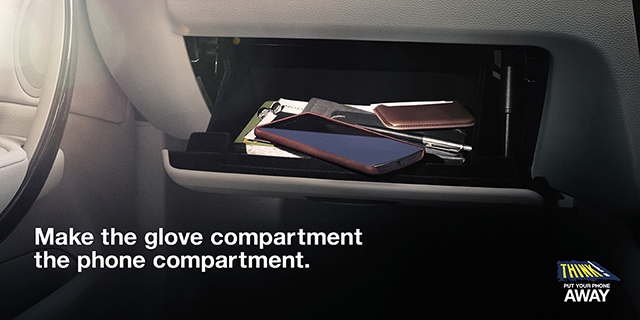Life’s busy – understatement. There are constantly at least 50 things competing for our attention, and that doesn’t change when we get behind the wheel. But the more we try to multitask, the more likely we are to have an accident. In the name of saving lives, it’s time to remove some of that distraction and temptation by hiding the phone when we're driving.
How does texting affect driving?
1. Distraction – driving and using your phone requires you to concentrate on two ‘thinking’ tasks at once, which our brains are not programmed to do effectively
2. Physical impairment – holding your phone leaves only one hand in control of the car
3. Visual impairment – glancing down at your phone means taking your eyes off the road. Even looking away for a couple of seconds means you miss whole stretches of road, which increases your chance of a collision
Dangers of driving while texting include:
- Failing to spot road signs or traffic lights
- Failing to notice that the vehicle in front has slowed or stopped
- Drifting across lanes
- Failing to spot hazards, pedestrians or cyclists
- Failing to be aware of stopping distances
AA President Edmund King says that the hike in fatalities on built-up roads by more than a third "may be due to driver inattention from excessive use of mobile phones at the wheel"(1).
What's more dangerous – text driving or drink driving?
You're twice as likely to crash text driving as you are drink driving. Yet most of us wouldn’t dream of driving if we were over the limit.
A 2002 study by the Transport Research Laboratory found that certain aspects of driving performance are impaired more by using a phone than by having a blood alcohol level at the legal limit (80mg/100ml). The texting drivers’ reaction time was 2.8 times greater when compared to the drink-drive limit in England and Wales.
We’ve launched a short film to really bring home the similarity in risk between drink-driving and text-driving. AA President Edmund King says: “Our new ad builds on the success of drink drive campaigns and makes text driving as socially unacceptable as drink driving.”
Transport Secretary Chris Grayling adds: “Using a phone at the wheel is simply unacceptable. Everyone has a part to play in encouraging their family and friends not to use their phones while driving – it is as inexcusable as drink driving.”
Why is it dangerous to use a phone while driving? Because you could kill someone. Mobile phone use was a contributory factor in 22 fatal and 75 serious accidents in 2015
Using a mobile phone while driving – the law
There's a lot of confusion around what's allowed and what's not. To be clear, it's illegal to use a handheld mobile while driving – this includes holding your phone to make a call, look at a text, or check social media. It applies even if you’re stopped at traffic lights or queuing in traffic.
- From March 2017, it’s 6 points and a £200 fine if you hold and use your phone while driving
- New drivers caught texting at the wheel within two years of passing their test will lose their licence and have to retake the test
- If the police think the offence so bad that a fixed penalty isn’t enough you could be taken to court
- Fines in court will almost certainly be larger and disqualification is possible – the maximum fine in a court is £1,000, or £2,500 you were driving a bus or a goods vehicle
- If your driving’s bad, or if there’s a crash while you’re using the phone, you could be prosecuted for careless driving, dangerous driving or, if someone is killed, for causing death by careless or dangerous driving
- Fines can be much greater, and prison's almost certain if a death's caused
The Ministry of Justice recently finished a consultation on increasing the maximum sentence for causing death by dangerous driving from 14 years to life imprisonment in an additional crackdown on reckless drivers.
Why it's important to stay in proper control of your vehicle
Even with your phone in a cradle, doing anything beyond a single button press to answer a call or select a route on a satnav app is likely to be too distracting and could therefore be considered ‘not in proper control’ or ‘driving without due care and attention’. The penalties for 'not in proper control' are:
- £100 fine and 3 points, or
- Up to £1,000 (£2,500 if you were driving a bus or a goods vehicle) if it goes to court.
You could also be prosecuted for ‘driving without due care and attention’:
- Driving in a way that falls below what would be expected of a competent and careful driver.
- Driving without reasonable consideration for other persons requires them to be inconvenienced by your driving.
A mother and three children were killed in a crash caused by a lorry driver using a mobile phone in 2016 (2). The driver was sentenced to 10 years in jail after driving for almost one kilometre while changing music on his phone, without looking at the road.

Tips for avoiding using your phone while driving
- Take away temptation – make one simple change to your driving habits and hide the phone away before you leave. The Department of Transport has launched a campaign encouraging drivers to make the glove compartment a phone compartment and always put your phone away before you set off. Commit 100% of your attention to the task in hand – controlling the vehicle
- If you have a regular compulsion to Tweet, text or check voicemails, plan rest stops enroute where you can check your phone safely with the engine switched off
- Before you stow it away, let your friends and family know you’re going to be out of touch for a while because you want to focus on your driving. This helps set expectations and minimise those annoying buzzes and pings
- Do your multi-tasking outside the car. If you need to call someone, call before you leave. Text before you drive, or when you get to a services
- If you can stomach it, turn your phone off completely, or put it in silent or flight mode so you don’t receive any calls or notifications
- Prepare a long playlist for the journey, or download an audiobook before you leave
- Delegate any other DJing, social media updates, navigation or temperature control tasks to a passenger if you have one
If text driving is so dangerous, why do people do it?
Using handheld devices, such as phones, while driving has been illegal since 2003. We know drivers consider it dangerous to use mobile phones behind the wheel, but many still do it.
Zoe Carvin, a teacher and mother of two from Northumberland, was killed 11 years ago by a driver texting on his phone. The following film tells the story of Zoe’s husband Paul and their children Emily and Ben, as they describe the impact that a single text had on their life.
Are you a smartphone addict?
It’s thought that part of the reason text driving is still prevalent is because phones are addictive. Research by Deloitte in 2016 found that ‘fear of missing out’ leaves many in the grip of an addiction to their devices. Smartphone addiction is a recognised disorder for which you can now get treatment. And our own research* backs this up:
- A fifth of drivers (21%) can’t bear to turn off their phones before driving
- More than half of young drivers (51%) can’t bear to (4)
It's not just the police who are watching
Many cars are now fitted with dashcams, plenty of cyclists use helmet cams, and CCTV is everywhere. The police have also been using unmarked lorries to keep an eye on drivers using phones from a higher seating position (3). So don’t think that if you can’t see any police you’re in the clear.
Whoever that message is from, it can wait
If you leave your phone at home, or worse – break it or lose it – you can feel totally lost. Yes it’s only a phone, but without it you can feel totally disconnected from friends, family…your entire social circle. Nomophobia – fear of being without a mobile phone – is now a recognised anxiety disorder. But the world really won’t stop turning if you’re without your phone for a while. Nothing’s important enough to risk lives on your journey. Whatever it is, it can wait ‘til you get there.
#NeverTextDrive
1 March 2017
(1) https://www.theaa.com/newsroom/aa-news-2016/never-text-drive-aa-charitable-trust.html
(2) http://www.ibtimes.co.uk/mother-three-children-killed-a34-horror-crash-lorry-driver-changed-music-his-mobile-phone-1580610
(3) https://www.theaa.com/driving-advice/legal/mobile-phones
(4) http://www.theaa.com/about-us/newsroom/twice-as-likely-to-crash-text-driving-as-drink-driving
